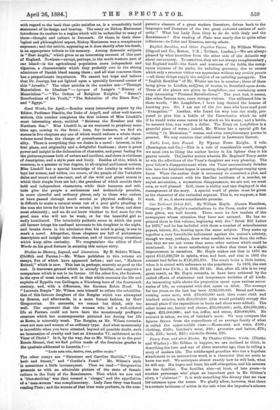Studies in History, Legend, and Literature. By H. Schutz Wilson.
(Griffith and Farran.)—Mr. Wilson publishes in this volume six essays, five of which have appeared before ; and one, " Madame Roland," which is new. This last is, perhaps, scarcely as good as the rest. It traverses ground which is already familiar, and suggests a comparison which is not in its favour. Of the other five, the freshest, in the eyes of most readers, will be that which recounts the life and exploits of Eppelin von Gailingen, a Nurnberg hero of the fourteenth century, and, with a difference, the German Robin Hood. In " Lucrezia Borgia" Mr. Wilson sets himself to refute the rehabilita- tion of this famous daughter of the Borgias which was attempted by Roscoe, and afterwards, in a more formal fashion, by Herr Gregorovias. He succeeds, we cannot bat think, only too well. The argument that the woman who led a well-ordered life at Ferrara could not have been the monstrously profligate creature which her contemporaries pictured her during her life at Rome, is miserably weak. The Borgias, as Mr. Wilson remarks, were not men and women of an ordinary type. And what monstrosity is incredible when you have attested, beyond all possible doubt, such an incarnation of cruelty and lust as Alexander VI. enthroned as the Vicar of Christ F Is it, by the way, due to Mr. Wilson or to the poet Eroole Strozzi, that we find poilice made of the feminine gender in the quatrain addressed to Lucretia P— • Laeto nata solo, dextra, rosa, police carpta."
The other essays are " Straensee and Caroline Matilda," "Eliza- beth and Stuart," and " Goethe's Faust." Mr. Wilson's style
• is sometimes a little inconsequent. Thus we read—" Gregorovius presents us with an admirable picture of the state of female culture in the Italy of the Renaissance. That which we now call a 'blue-stocking' was then termed a virago," and the appellation of a `man-woman' was complimentary. Lady Jane Grey was found reading Plato ; and the women of that time were perforce, in the com-
parative absence of a great modern literature, driven back to the languages and literature of the two great cultured nations of anti- quity." What has Lady Jane Grey to do do with Italy and the Renaissance F Her rending of Plato was surely due to quite other influences—to Colet and Erasmus, among others.


































 Previous page
Previous page